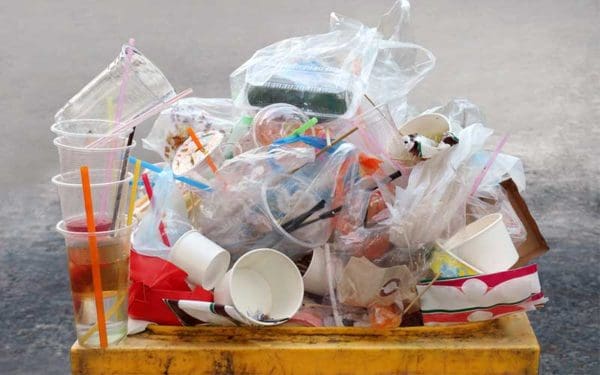
Dangerous PFAS chemicals hide in thousands of everyday products, including food packaging. We must start taking commonsense steps today to reduce our exposure to the entire class of PFAS chemicals going forward. Photo: beats1 via Shutterstock
Vermonters have said no to lead, BPA, mercury, flame retardants, and more in our consumer products. Now it’s time to tackle toxic PFAS chemicals.
A new bill making its way through the legislature would turn off the tap on these dangerous chemicals by banning their use in some of the most widely used products on the market.
CLF has been fighting to protect New Englanders from these toxic “forever chemicals.” Senate Bill 20 would be a critical step forward in Vermont.
What’s the Problem?
Toxic PFAS – or “forever chemicals” – have been found at unsafe levels across Vermont. More than 100 public water supplies and hundreds of private wells have been contaminated. Surface and groundwaters, along with sludge that farmers use on their fields, are tainted, too.
More than 9,000 kinds of these dangerous chemicals are used today – with more still being developed. They can be found in common household products that we use every day, from nonstick cookware to food wrappers, water-repellent clothing to stain-resistant fabrics and carpets.
The risks caused by PFAS chemicals are well known, but federal agencies, including the EPA and FDA, have failed to take meaningful action to protect us from them. CLF and our partners have been calling on state leaders across New England to step in to safeguard our waters – and our health – from these dangerous poisons.
What’s at Stake?
Forever chemicals form a perfect public health storm. They are toxic to people even in tiny doses and don’t break down over time. They also tend to be highly mobile in the environment and can build up in our blood for years.
Scientific studies show that PFAS may affect growth, learning, and behavior in infants and children and make it harder for a woman to get pregnant. They may interfere with natural human hormones and the immune system, increase cholesterol, and disrupt liver, thyroid, and pancreatic function. Researchers also suspect that some PFAS may increase the risk of cancer. No medical interventions will remove them from the body.
On top of these serious health threats, exposure to even small amounts of PFAS may not only make people more vulnerable to COVID-19 but also could diminish the effectiveness of a coronavirus vaccine.
You and I get exposed to these chemicals through ingesting contaminated drinking water and food, inhaling indoor air containing PFAS particles from carpets or furniture, and coming into contact with products that contain PFAS like food packaging, dental floss, and clothing.
What’s more, PFAS chemicals are difficult and expensive to clean up once they are in the environment, and the technology to truly destroy them is not commercially available yet.
What’s the Solution?
State regulators are already making some progress towards protecting Vermonters from this dire threat. A bill passed in 2019 requires the testing and setting of drinking water and cleanup standards for some PFAS.
But it is not enough.
We must start taking commonsense steps today to reduce our exposure to the entire class of PFAS chemicals going forward. With Senate Bill 20, we can go upstream and turn off the tap by getting PFAS and other chemicals out of:
- Firefighting foam: Firefighters should not have to worry about exposure to dangerous chemicals in the line-of-duty.
- Food packaging: No one should have to wonder if packaging has contaminated their food.
- Carpets and rugs: We all should feel confident that our homes are safe.
- Ski wax: Vermonters should not have to think about whether our ski resorts are inadvertently tainting our environment.
The bill also would require manufacturers to report if they used PFAS chemicals in any children’s products sold in Vermont.
Want to Help?
The Senate has already unanimously voted to approve this bill, but the House must still act to put these critical protections on the books. Contact your Representatives and ask them to support Senate Bill 20 today. Calls from as few as eight constituents can get a legislator’s attention on an issue – your call could make all the difference.
By passing this bill, we can stop PFAS contamination before it starts and ensure a healthier future for our children and environment.



